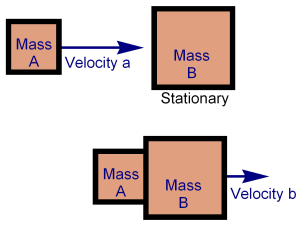Collision
In physics, kinetic
energy is the energy of motion.
Work is done to
accelerate the body of a given mass from rest to the current
velocity.
The same amount of
work is done by the body to decelerate from the current velocity.
Kinetic energy is
gained through acceleration, and remains constant for a body with
a constant velocity and mass .
In classic mechanics
the kinetic energy of a non-rotating object of mass(m) traveling
at a velocity(v) is (mv^2)/2
In relativistic
mechanics, this is a good approximation only when the velocity is
much less than the speed of light, luckily there are no
projectiles that I know of that approach such a speed.
So, in order to
assess the amount of energy transferred to a body at collision we
will need to know the mass of the projectile and the
velocity of the projectile just prior to the collision.
Kinetic energy can be
passed from one object to another by way of collision.

http://physics.stackexchange.com/questions/133759/conservation-of-momentum-but-not-kinetic-energy-in-inelastic-collisions
There are two types
of collisions that result in transfer of energy, elastic collision
and inelastic collision.
Elastic collision-" An elastic collision
is an encounter between two bodies in which the total kinetic
energy of the two bodies after the encounter is equal to their
total kinetic energy before the encounter. Elastic collisions
occur only if there is no net conversion of kinetic energy into
other forms."
Inelastic
collision-"An inelastic collision, in contrast, is a
collision in which kinetic energy is not conserved. In inelastic
collisions of macroscopic bodies, some kinetic energy is turned
into vibrational energy of the atoms, causing a heating effect,
and the bodies are deformed."
In the case that a
high speed projectile colliding with a body, the result is a
partially inelastic collision because the masses do not rebound
off of one another but they don't exactly stick together either,
kinetic energy changes into different forms of energy.
Although in an
inelastic collision the kinetic energy is not necessarily
conserved the total energy of the isolated system is.
In physics, the law
of conservation of energy states that the total
energy of an isolated system cannot change—it is said to be
conserved over time. Energy can be neither created nor
destroyed, but can change form.
It is important to
understand that in order for the hydrostatic shock wave to occur
that this transformation of energy is taking place.
